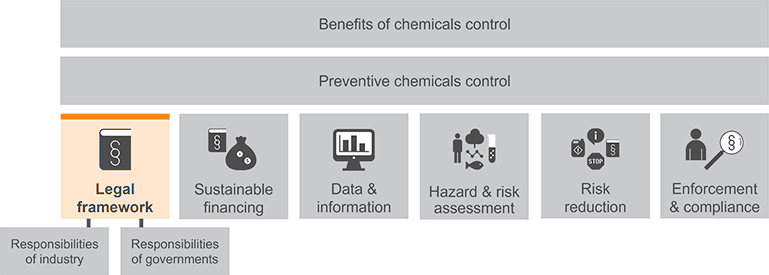Legal framework for chemicals control
A legal framework is necessary for preventive chemicals control, and it needs to clearly define roles and responsibilities of different actors. Chemicals legislation should minimize risks due to the hazards from chemical substances.
A legal framework is necessary
Chemicals control aims to minimize risks to human health and the environment due to hazards from chemicals. To establish chemicals control and provide for sound chemicals management it is necessary to have relevant national legislation in place.
Legislation on chemicals on the market can for instance cover issues such as requirements on classification and labelling of chemical substances and mixtures, bans and restrictions of chemicals in various products, implementation of relevant international agreements and conventions, provisions for enforcement and clear definitions of the responsibilities of industry and of government authorities.
Regulation of the placing of chemicals on the market allows for the control of chemicals when, or even before, they are placed on the national market. This is what is called preventive chemicals control. Such legislation is a central driver for the protection of human health and the environment.
Having good legislation in place can also facilitate trade of chemicals between countries.
Chemicals legislation can support all other areas where chemicals are of concern, such as environmental protection and worker and consumer health and safely. Efficient control of the flow of chemicals onto the market, is complementary to risk management in the handling of chemicals, irrespective of where or for what use.
Important to define responsibilities
It is important that the legislation clarifies the division of responsibilities between trade and industry on the one hand and the national administration on the other hand. It is reasonable that the main responsibilities for managing risks with chemicals placed on the market should lie with the chemical producers and importers for the risks that might emerge from the chemicals they produce and import. It is, therefore, central to develop legislation that allocates responsibilities to companies in order to internalise most of the costs of chemicals management.
The main stakeholders concerned with chemicals control are legislators, appropriate government authorities, and trade and industry. The producers and importers of chemicals play an important role as they are placing the chemicals on the market.
Important legal principles
When developing a legal framework, the following general legal principles should be considered:
- Rule of law
The rule of law is the principle that law should govern a nation, as opposed to being governed by decisions of individual government officials. It primarily refers to the influence and authority of law within society, particularly as a constraint upon behaviour, including behaviour of government officials. - Accountability
The government as well as private actors should be accountable under the law. - Just laws
The laws should be clear, publicized, stable, and just. Laws should be applied evenly and protect fundamental rights, including the security of persons and property and certain core human rights. - Open government
The processes by which the laws are enacted, administered, and enforced should be transparent, fair, and efficient. - Accessible & Impartial Dispute Resolution
Justice should be delivered timely by competent, ethical, and independent representatives who are accessible, have adequate resources, and reflect the composition of the communities they serve.
Guidance on legislation on chemicals placed on the market
This guidance document focuses on how countries can establish a legal framework, centering on legislation for preventive chemicals control concerning placing on the market of chemicals.
The guidance covers the following areas:
- Basis and arguments for chemicals legislation
- What should be regulated?
- Defining responsibilities for public and private sector
- Structure of legislation - primary and secondary legislation
- Main content of a chemicals law
- Further resources
Read our Guidance on Legislation on chemicals placed on the market.
This guidance complements the UNEP Guidance on the Development of Legal and Institutional Infrastructures and Measures for Recovering Costs of National Administration for Sound Management of Chemicals (LIRA Guidance).
Credits
Illustrations by Maja Modén.


